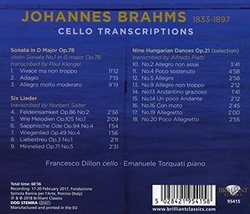| All Artists: Francesco Dillon, Emanuele Torquati Title: Brahms: Cello Transcriptions Members Wishing: 0 Total Copies: 0 Label: Brilliant Classics Release Date: 4/27/2018 Genre: Classical Style: Chamber Music Number of Discs: 1 SwapaCD Credits: 1 |
Search - Francesco Dillon, Emanuele Torquati :: Brahms: Cello Transcriptions
 | Francesco Dillon, Emanuele Torquati Brahms: Cello Transcriptions Genre: Classical Brahms, like most composers, had no scruple about arranging his own music for other forces, whether to disseminate it further or earn useful income or both. Sometimes he undertook the transcription of his orchestral works ... more » |
Larger Image |
CD Details
Synopsis
Product Description
Brahms, like most composers, had no scruple about arranging his own music for other forces, whether to disseminate it further or earn useful income or both. Sometimes he undertook the transcription of his orchestral works for the popular domestic market of piano duet; on other occasions he left the work to trusted friends and colleagues. Although the composer did not apparently have any other instrument in mind when he wrote the First Violin Sonata, the piece sits peculiarly well on the cello once transposed to the key of D major by the cellist Paul Klengel; its pervasive mood of profound melancholy is even enhanced by the cellos voice. Clara Schumann recognized the sonata as one of Brahmss most tender yet regretful tributes to her, and wished that it should be played at her funeral, to which purpose Klengels transcription is eminently suited. Norbert Salter (1868-1935) was a cellist who played under Mahler in both Budapest and Hamburg; this is his only published transcription, a set of six Lieder by Brahms which may well have been made under the elderly composers supervision. Like the Brahms/Klengel Sonata, this is a sensitive yet now little-known piece of work which deserves modern appreciation. Francesco Dillon and Emanuele Torquati conclude their fourth album for Brilliant Classics in a lighter vein, with nine of the ever-popular Hungarian Dances, arranged to stylish effect by the Italian virtuoso Alfredo Piatti who did so much to advance the cause of the cello as a solo instrument in the 19th century.
